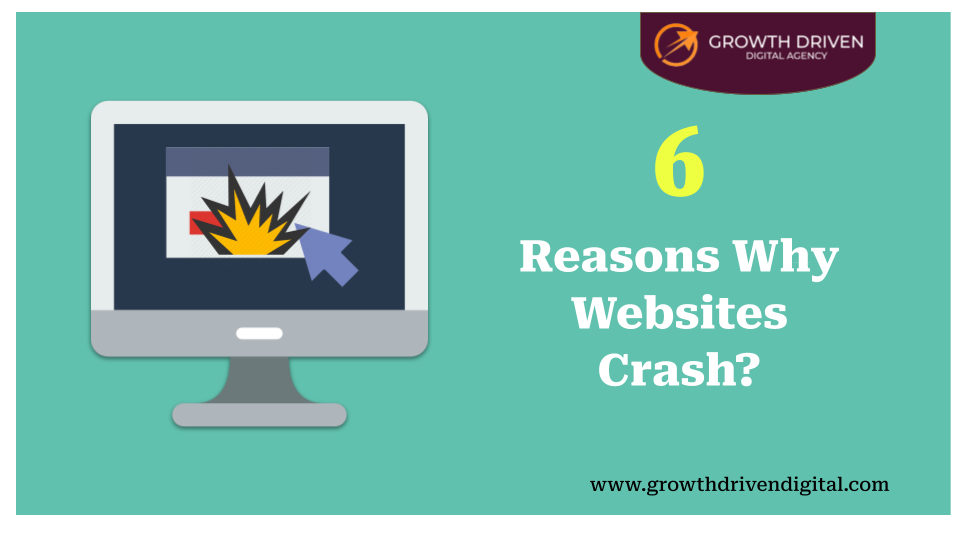The number of reasons why websites crash, include faulty hosting, malicious attacks, and malfunctioning coding. Continue reading to learn more.
Your company’s website serves as its public face. Your reputation and productivity are both impacted when it crashes. For any business owner, it’s not a welcome surprise, especially if he has no idea why it occurred. Additionally, a website collapse causes downtime, which frustrates users, lowers search engine ranks, and costs a business reputation, clients, and consumers, among other things.
For digital marketing solutions and to effectively communicate with your target market, choose Growth Driven Marketing Agency. Their expertise makes them the best online advertising specialists.
What is referred to as a website crash?
It is reasonable to assume that your website has crashed when it can no longer send or receive data and users are unable to access it. Website crashes are the colloquial term for when a website stops working. Despite how straightforward they may seem; the causes of website crashes can be difficult to comprehend. Corrective actions can only be put in place once you know what caused the crash.
How can you know that the website has crashed?
It is important not to believe your staff or clients when they tell you that your website has crashed. Access the website to verify if it is operational (accessible). To be sure you aren’t reading pages Google has cached, hit F5 while holding down the shift key.
If you can access the website as the service provider, then the client’s computer or internet connection is broken. Tell him to go to an established website, such as Instagram.com or Amazon.com. Try checking the website on additional digital devices once you are certain there is not a problem on the internet provider’s end.
If it appears that all of your efforts have been in vain, you can sit down and think about the issue. Call the company that hosts your website and read the welcome email you were sent after signing up. Information like the IP address, root and admin passwords, panel position, etc could be helpful. For absolute assurance, utilize a website down checker as an alternative.
What causes a website crash, and Reasons Why Websites Crash?
1. Plugin errors
Plugins are essential resources that provide your website with more functionality. They give higher productivity, increased security, and a better browsing experience. Nevertheless, some plugins may clash and cause the website to crash or cease functioning.
If your website fails and you assume a plugin problem is to blame, consider why. Have you added a fresh plugin? Did you alter the theme of the website, update an existing plugin, or adjust a PHP file? To find the issue and restore service to the website, your IT staff must move quickly.
2. Code Errors
The worst possible mistake is to break the website. Your website can become fully unusable or become crippled. A website’s loading speed is increased by proper loading, but the contrary is also true. Avoiding unknown or dubious plugins is essential, and hiring a skilled developer to handle such problems is advised.
3. Hacking and Viruses
Normally, unprotected, unencrypted websites are the targets of hackers. They may crawl onto your website and inject malicious code into other files. Some of these might have an effect on how well your website performs, while others might make it crash. Cybercriminals frequently employ DDoS and bots to target websites.
4. Expired Domains
It is important to realize that domain hosting and server hosting are two very separate things. If you don’t renew your domain hosting, someone else could be able to register the name. You’ll receive a notice 20 days before your domain name expires. Enable the auto-renewal option to keep your domain from expiring. You can typically choose to renew your domain for an additional 10 years.
5. Error from Hosting Provider
The website of your customer can crash if there has been an increase in traffic that the server is unable to handle. This may also occur if the server is physically located too far from the users of the website.
Additionally, if the hosting package for one of your clients can’t handle an increase in visits, the client’s website will begin to load slowly or even crash. Affordable hosting packages and shared hosting options frequently have this problem.
Obtaining cloud hosting for your or the client’s website greatly resolves this problem.
6. Traffic surges
This subject relates to the hosting of websites.
Websites can only accommodate a certain number of visitors at once. The website crashes when it gets too many visitors for it to manage.
Technically speaking, the website’s bandwidth and memory are insufficient to handle rapid increases in online traffic.
This is typically the cause of online stores going offline over the holidays or when they announce a particularly tempting deal.
It’s a good idea to review your hosting plan during periods of high traffic. This can, for the most part, protect you from heavy traffic.



